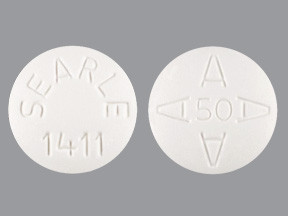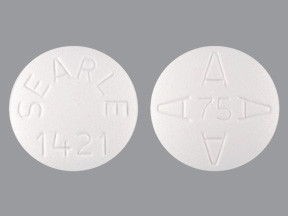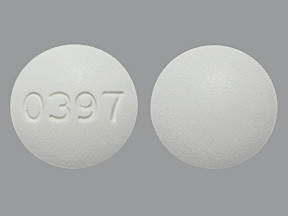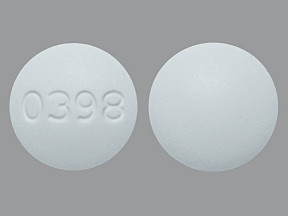DICLOFENAC/MISOPROSTOL - ORAL
PHONETIC PRONUNCIATION: (dye-KLOE-fen-ak/MYE-soe-PROS-tol)
COMMON BRAND NAME(S): Arthrotec
GENERIC NAME(S): diclofenac sodium/misoprostol
Uses
USES: Diclofenac is used to reduce pain, swelling, and joint stiffness from arthritis. Diclofenac is known as a nonsteroidal anti-inflammatory drug (NSAID). Misoprostol protects the stomach from diclofenac's irritating effects. This combination medication is used to treat arthritis in people at high risk of getting stomach/intestinal ulcers and complications from the ulcers (such as bleeding). If you are treating a chronic condition such as arthritis, ask your doctor about non-drug treatments and/or using other medications to treat your pain. See also Warning section.
How to use DICLOFENAC/MISOPROSTOL - ORAL
HOW TO USE: Read the Medication Guide provided by your pharmacist before you start using this medication and each time you get a refill. If you have any questions, ask your doctor or pharmacist. Take this medication by mouth with a full glass of water (8 ounces/240 milliliters) unless your doctor directs you otherwise. Do not lie down for at least 10 minutes after taking this medication. Swallow the tablets whole. Do not crush, chew, or dissolve the tablets. Doing so can increase the risk of side effects. Do not take tablets that are broken. Take this medication with food to prevent stomach upset and to reduce the chances of diarrhea. Avoid taking antacids that contain magnesium while using this medication because they may worsen diarrhea. If you need an antacid, consult your doctor or pharmacist to help you choose a product. The dosage is based on your medical condition, response to treatment, and other medications you may be taking. Be sure to tell your doctor and pharmacist about all the products you use (including prescription drugs, nonprescription drugs, and herbal products). To reduce your risk of stomach bleeding and other side effects, take this medication at the lowest effective dose for the shortest possible time. Do not increase your dose or use this drug more often or for longer than prescribed. For ongoing conditions such as arthritis, keep taking this medication as directed. Discuss the risks and benefits with your doctor or pharmacist. Use this medication regularly to get the most benefit from it. To help you remember, take it at the same times each day. It may take up to 2 weeks of taking this drug regularly before you get the full benefit. Tell your doctor if your condition does not get better or if it gets worse.
Side Effects
Precautions
Interactions
Overdose
Images

- color
- white
- shape
- round
- imprint
- logo and 50, SEARLE 1411

- color
- white
- shape
- round
- imprint
- logo and 50, SEARLE 1411

- color
- white
- shape
- round
- imprint
- logo and 75, SEARLE 1421
Reviews
Warning
WARNING: This medication is a combination of 2 drugs: diclofenac and misoprostol. Do not take this medication if you are pregnant or think that you may be pregnant. Misoprostol may cause loss of pregnancy, premature birth, or birth defects. In rare cases, serious problems (such as uterine rupture) have occurred when misoprostol was used to start labor or used in combination with another drug to end pregnancy after the eighth week. These problems have caused harm to the mother and unborn baby. Avoid pregnancy while taking this medication and for at least one month or one complete menstrual cycle after you have stopped treatment. If you become pregnant while taking this medication, contact your doctor right away. If you are of a woman of childbearing age, do not use this medication unless you need a nonsteroidal anti-inflammatory drug (NSAID) such as diclofenac and you are at high risk of having an ulcer or ulcer complications from NSAID treatment. Female patients must meet the following four requirements in order to use this drug: 1) test negative for pregnancy within 2 weeks before starting treatment; 2) use effective birth control to prevent pregnancy; 3) receive oral and written warnings on the dangers of using misoprostol while of childbearing age and the risks of possible birth control failure; 4) start taking this medication only on the second or third day of the next normal menstrual period. This medication must not be shared with others. Nonsteroidal anti-inflammatory drugs (including diclofenac) may rarely increase the risk for a heart attack or stroke. This effect can happen at any time while taking this drug but is more likely if you take it for a long time. The risk may be greater if you have heart disease or increased risk for heart disease (for example, due to smoking, family history of heart disease, or conditions such as high blood pressure or diabetes). Do not take this drug right before or after heart bypass surgery (CABG). Also, diclofenac may rarely cause serious (rarely fatal) bleeding from the stomach or intestines. This effect can occur without warning symptoms at any time while taking this drug. Older adults may be at higher risk for this effect. Stop taking this medication and get medical help right away if you notice any of these rare but serious side effects: stomach/abdominal pain that doesn't go away, black/tarry stools, vomit that looks like coffee grounds, chest/jaw/left arm pain, shortness of breath, unusual sweating, confusion, weakness on one side of the body, trouble speaking, sudden vision changes. Talk to your doctor or pharmacist about the benefits and risks of taking this drug.
Disclaimer
IMPORTANT: HOW TO USE THIS INFORMATION: This is a summary and does NOT have all possible information about this product. This information does not assure that this product is safe, effective, or appropriate for you. This information is not individual medical advice and does not substitute for the advice of your health care professional. Always ask your health care professional for complete information about this product and your specific health needs.



No Reviews Yet